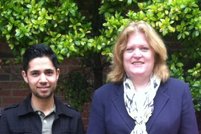A leader of the federal agency that oversees resettlement of refugees in the United States was in Philadelphia last week for a trip that allowed her to hear directly from LGBT refugees who have found a home in the country.
Anne Richard, assistant secretary of Population, Refugees and Migration in the U.S. Department of State, delivered the keynote address at the Hebrew Immigrant Aid Society National Refugee Resettlement Conference May 8 and also met with representatives of the Nationalities Service Center’s Rainbow Welcome Initiative, which serves LGBT refugees.
PRM supports resettlement efforts and funds initiatives to protect and aid refugees abroad.
In an interview with PGN, Richard said LGBT refugees are at particular risk.
“What we’re finding is that LGBT refugees are some of the most vulnerable of the refugees we care about,” she said. “In some of the societies in which refugees live, there is still a great deal of societal disapproval about being LGBT, so people hide their status to the extent they can if they’re a sexual minority. And, as a result, they’re hard sometimes for us to find and identify; they have to self-identify in order for us to provide them with the services they may need. It can be dangerous to be a refugee, and it can be quite dangerous to be an LGBT refugee. LGBT refugees can fall prey to people who want to harm them — from being picked on to being jailed to being killed.”
Richard said 87 countries have laws on the books that criminalize same-sex sexual conduct.
Often, the people who flee such countries still find themselves in nearby jurisdictions whose laws may not be much better, Richard said.
The U.S. has taken strides in recent years to address some of those issues, she added.
“President Obama put out a memorandum in December 2011 to advance the human rights of LGBT persons. It required all U.S. agencies working abroad to ensure that they were promoting and protecting the rights of LGBT persons through U.S. diplomacy and foreign aid. And we report annually on our progress,” she explained. “For our bureau, that means a special focus on LGBT refugees, and ensuring they’re identified to the extent they want to be identified and that folks working in our programs overseas are trained to be sensitive about the plight LGBT refugees may be experiencing.”
Uganda has garnered international attention for its antigay culture, sparked by legislative efforts to instate the death penalty for repeated same-sex sexual conduct.
PRM has funded legal- and medical-aid programs to survivors of gender-based violence in Uganda and has also directed funding to outreach programs for LGBT people there, Richard said.
“Uganda and the U.S. have been close collaborators on foreign-aid projects, including those that fight HIV/AIDS. So for me it feels like a setback to have Uganda go after gay people in their country,” she said. “I’m part of a country that is so proactive in trying to help LGBT people around the world. People look to the U.S. as a model for the rest of the world. We’re in a moment where we’re doing the right thing, and that’s good not just for the beneficiaries of our programs but it also models the right thing to do for other countries.”
Richard got the chance to put a personal face to the issue while she was in Philadelphia.
During her visit, she met with a transgender Iranian man who was assisted by the Rainbow Welcome Initiative and is now living in Philadelphia, an experience she said was eye-opening.
“He is living and thriving in Philadelphia, having grown up in Iran in a family that very much wanted him to be a little girl,” she said. “He was just the most helpful, energized, optimistic person you could meet. Part of it is sad that he had to leave his homeland and family, but he has so much more freedom to be himself than he had in Iran. And through his whole journey, he’s been trying to help other people. Here was somebody who came and needed help, got it and immediately turned around to start helping others. People often think of refugees as victims, but we forget that they’re also survivors and they have their own strength.”

